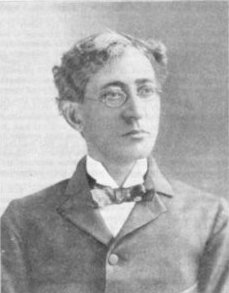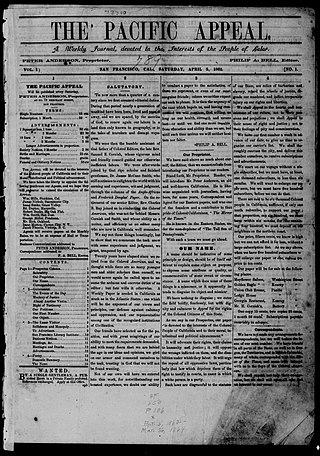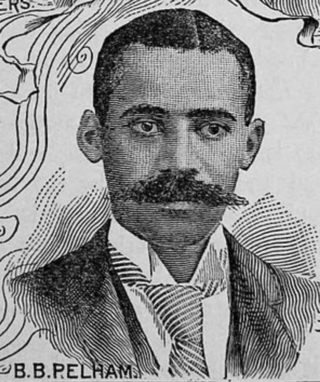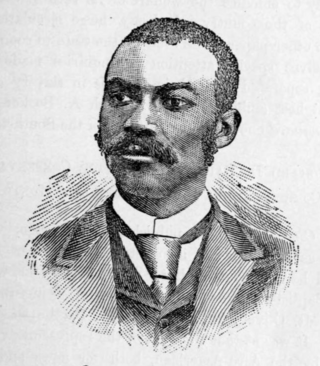Related Research Articles

Timothy Thomas Fortune was an American orator, civil rights leader, journalist, writer, editor and publisher. He was the highly influential editor of the nation's leading black newspaper The New York Age and was the leading economist in the black community. He was a long-time adviser to Booker T. Washington and was the editor of Washington's first autobiography, The Story of My Life and Work. Fortune's philosophy of militant agitation on behalf of the rights of black people laid one of the foundations of the Civil Rights Movement.

Freedom's Journal was the first African American owned and operated newspaper published in the United States. Founded by Rev. John Wilk and other free Black men in New York City, it was published weekly starting with the March 16, 1827 issue. Freedom's Journal was superseded in 1829 by The Rights of All, published between 1829 and 1830 by Samuel Cornish, the former senior editor of the Journal. The View covered it as part of Black History Month in 2021.

Shorter College is a private, historically black, liberal arts junior college in North Little Rock, Arkansas. It is the only private historically black junior college in the United States. Shorter College was founded in 1886 as Bethel University by the Twelfth Episcopal District of the African Methodist Episcopal (A.M.E.) Church. The college is accredited by the Transnational Association of Christian Colleges and Schools and offers associate degrees through its six programs.

Irvine Garland Penn was an American educator, journalist, and lay leader in the Methodist Episcopal Church. He was the author of The Afro-American Press and Its Editors, published in 1891, and a coauthor with Frederick Douglass, Ida B. Wells, and Ferdinand Lee Barnett of The Reason Why the Colored American Is Not in the World's Columbia Exposition in 1893. In the late 1890s, he became an officer in the Methodist Episcopal Church and played an important role advocating for the interests of African Americans in the church until his death.

Pacific Appeal was an African-American newspaper based in San Francisco and published from April 1862 to June 1880.
Henry Johnson Maxwell was a lawyer, soldier in the Union Army, state senator, and postmaster in South Carolina.

Atlanta's Berlin Wall, also known as the Peyton Road Affair or the Peyton Wall, refers to an event during the civil rights movement in Atlanta, Georgia, United States, in 1962. On December 17 of that year, the government of Atlanta, led by mayor Ivan Allen Jr., erected a barricade in the Cascade Heights neighborhood, mostly along Peyton Road, for the purposes of dissuading African Americans from moving into the neighborhood. The act was criticized by many African American leaders and civil rights groups in the city, and on March 1 of the following year the barricade was ruled unconstitutional and removed. The incident is seen as one of the most public examples of white Americans' fears of racial integration in Atlanta.

Mathew McFarlan Lewey, was an American newspaper editor and publisher, postmaster, lawyer, politician, and justice of the peace in Florida. He also served as an officer in the Union Army, and as a militia officer. Lewey, who was from Baltimore, Maryland, was the first licensed Black male lawyer in Florida. He was a member of the National Negro Business League. He also used the name M.M. Lewey.

Jesse Chisholm Duke was a religious and political leader in Alabama who established and edited the Baptist Montgomery Herald newspaper and served as a Selma University trustee. He advocated for civil rights for African Americans.
Southland College, originally the Helena Orphan Asylum and eventually Southland Institute, was established in Helena, Arkansas for orphaned African American children April 19, 1864 by Indiana Quakers Alida and Calvin Clark and supported by various Quakers over several decades. Established as an orphanage called the Helena Orphan Asylum within Helena, the original request for the creation of an orphanage had come from General N. B. Buford who was the Federal Commandant at Helena during the civil war.

Edwin Henry Hackley, also commonly known as Edwin H. Hackley, was the first African descended lawyer admitted to the Colorado Bar Association (1883). Beginning in 1886, he worked as the Denver County Clerk, and then spent almost 14 years as an Abstract Clerk. He practiced law when he could, but after some time he closed his practice because it was not profitable.

Col. William Murrell, Jr. also known simply as William Murrell, was an American newspaper editor, and politician. He represented Madison Parish in the Louisiana House of Representatives from for two terms.

The True Southerner was a weekly newspaper published during the Reconstruction era after the American Civil War in Hampton, Virginia and then Norfolk, Virginia. It advocated for the rights of African Americans and was the first African-American newspaper published in Virginia. Founded in 1865, the paper was moved to Norfolk early the next year, where Joseph T. Wilson served as its editor. The paper's offices and press were destroyed by a white mob in early 1866, and it ceased publication shortly thereafter.
Edward Allen Fulton was an American newspaperman, abolitionist, postmaster, farmer, and politician. He represented Drew County, Arkansas in the Arkansas House of Representatives in 1871. After being enslaved in Missouri, he became an abolitionist and lived in Chicago. He returned to the south after the American Civil War. He was an advocate of civil rights for African Americans. He campaigned to be Arkansas Secretary of State. He survived an assassination attempt.

Benjamin Burnside Pelham (1862–1948) was an American lawyer, accountant, political organizer, journalist, and newspaper publisher.
The Jacksonville Advocate was a weekly newspaper for African Americans in Jacksonville, Florida established in 1891.
William H. Tunnard was an American Confederate soldier, newspaper editor, and Civil War history author. His book A Southern Record: The History of the Third Regiment Louisiana Infantry was published in 1866. A reviewer writing during the 20th century stated "A Southern Record has been recognized as one of the best first person accounts of the Civil War." Historian Merton Coulter declared it to be an 'exceptionally valuable commentary,' while Allan Nevins described it as an 'excellent composite of personal accounts of battles and army life.'"
The Huntsville Gazette, also known as the Weekly Gazette, was a newspaper for African Americans in Huntsville, Alabama that ran from 1879 or 1881-1894. The Library of Congress has numerous editions in its collection. Charles Hendley Jr. served as its editor. He is buried at the Glenwood Cemetery in Huntsville.

John Quincy Adams (1848–1922) was an American newspaper editor and publisher, educator, civil rights activist, and politician. He served from 1887 to 1922 as the newspaper editor and later the owner of The Appeal of St. Paul, Minnesota. He served as an officer in the National Afro-American Council. He often went by the name J.Q. Adams.

Rev. Joseph Albert Booker (1859–1926), was an American newspaper editor, academic administrator, educator, minister, activist, and Black community leader. He was born into slavery and orphaned at a young age; Booker went on to served as the president of Arkansas Baptist College and editor of the Arkansas state’s Black Baptist newspaper, TheBaptist Vanguard.
References
- ↑ "Biographical and Historical Memoirs of Pulaski, Jefferson, Lonoke, Faulkner, Grant, Saline, Perry, Garland and Hot Spring Counties, Arkansas: Comprising a Condensed History of the State... Biographies of Distinguished Citizens...[etc.]". Goodspeed publishing Company. April 22, 1889 – via Google Books.
- ↑ "Julian Talbot Bailey - Arkansas Black Lawyers". arkansasblacklawyers.uark.edu.
- ↑ "Bailey". afrotexan.com.
- ↑ "Ayer Directory of Publications". Ayer Press. June 28, 1885 – via Google Books.
- ↑ Penn, Irvine Garland (January 10, 1891). The Afro-American Press and Its Editors. Willey & Company. ISBN 9780598582683 – via Google Books.
- ↑ "Julian Talbot: Lawyer and Strong Proponent of Civil Rights for African Americans". July 21, 2020.
- ↑ Smith, J. Clay Jr. (June 28, 1999). Emancipation: The Making of the Black Lawyer, 1844-1944. University of Pennsylvania Press. ISBN 0812216857 – via Google Books.
- ↑ "Prof. Julian Talbot Bailey". NYPL Digital Collections.